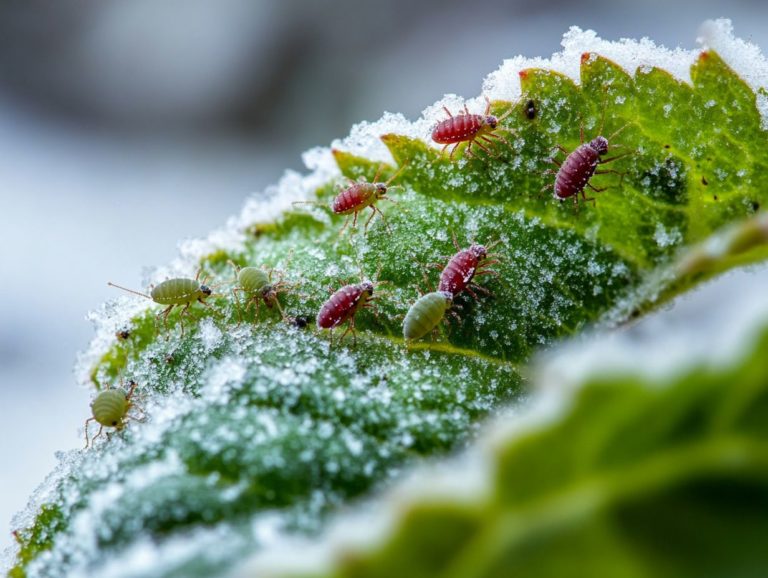How to Make Homemade Organic Insecticides?
In an era where sustainability is paramount, you may find yourself considering organic insecticides to protect your garden and home from annoying insects.
This article delves into the advantages of opting for natural solutions, featuring common household ingredients that are readily available to you.
You ll uncover simple recipes for homemade insecticides, complete with clear, step-by-step instructions tailored for various needs.
Learn how to apply these mixtures effectively and safely, ensuring that both your plants and family are kept out of harm’s way.
Jump in to discover how organic pest control can transform your gardening experience! Explore the remarkable benefits of organic pest control, including methods such as diatomaceous earth and soap sprays that can enhance your gardening practices!
Contents
- Key Takeaways:
- Benefits of Using Organic Insecticides
- Common Household Ingredients for Insecticides
- Recipes for Homemade Organic Insecticides
- Application and Effectiveness of Homemade Organic Insecticides
- Safety Considerations for Using Homemade Organic Insecticides
- Frequently Asked Questions
- 1. How do I make a homemade organic insecticide using natural ingredients?
- 2. Can I use essential oils to make an organic insecticide?
- 3. What are some commonly used organic ingredients for making insecticides?
- 4. Does homemade organic insecticide work as effectively as chemical-based insecticides?
- 5. Can I store homemade organic insecticide for future use?
- 6. Are there any safety precautions to follow when using homemade organic insecticides?
Key Takeaways:
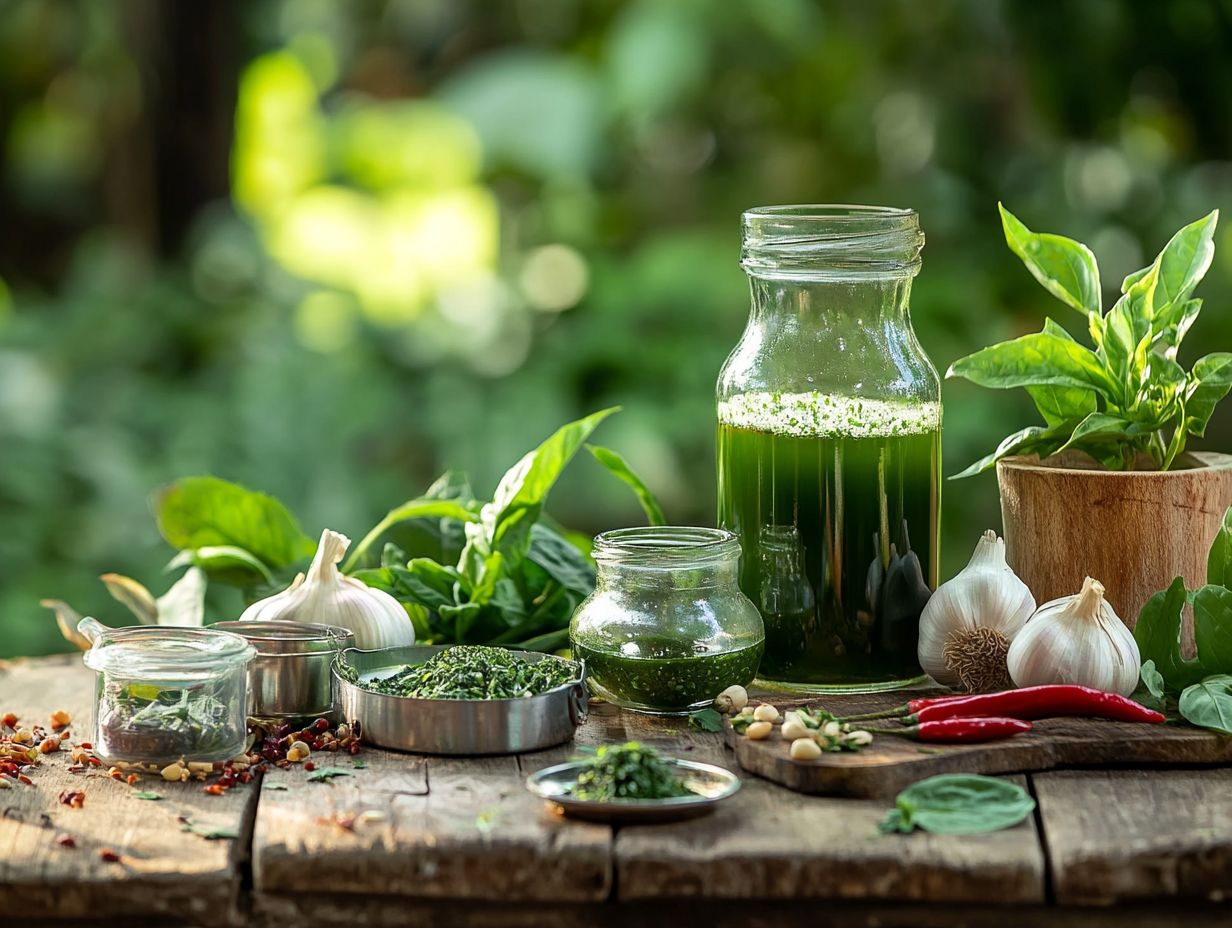
Benefits of Using Organic Insecticides
Utilizing organic insecticides presents a wealth of benefits that not only protect your garden from annoying insects but also help create a healthier environment.
Methods like neem oil spray and diatomaceous earth are not just effective; they are safer for beneficial insects such as ladybugs.
By choosing natural insecticides, you can significantly reduce your environmental footprint while still effectively warding off common nuisances like aphids and caterpillars.
These non-chemical approaches are especially beneficial for organic gardeners aiming to cultivate a balanced and flourishing environment for their plants.
Common Household Ingredients for Insecticides
Making insecticides from common household items is an easy and budget-friendly way to handle garden pests.
Ingredients such as vegetable oil, neem oil, garlic, and chile pepper serve as powerful natural deterrents against a wide range of insects, making them essential allies in your pest control toolkit!
Diatomaceous earth and soap sprays also provide effective solutions for organic gardeners committed to safeguarding their plants.
These ingredients not only enhance your pest management strategies but also ensure that your gardening practices align with eco-friendly and sustainable principles.
Identifying and Sourcing Natural Ingredients
Identifying and sourcing natural ingredients for homemade pesticides is essential for effective organic pest control.
As an organic gardener, you should consider your local environment and the specific insect pests you encounter, as some natural ingredients can affect plant sensitivity or the health of beneficial insects.
Ingredients like neem oil or garlic are readily available from local health stores or can be grown in your own garden, giving you a consistent supply for your pest management efforts.
By understanding the properties of these natural ingredients, you ll be able to choose the best options tailored to your unique gardening needs.
Along with sourcing these ingredients, take the time to evaluate their availability in your area.
Some plants thrive locally, while others may need a more controlled environment to flourish.
By planting herbs such as basil or lavender, you not only create a refuge that deters pests but also attract pollinators and beneficial insects that are crucial for maintaining ecosystem balance.
Paying attention to local climate conditions and soil types will help you make informed decisions about which ingredients to incorporate, ensuring that your pest control methods are both effective and safe for the surrounding flora and fauna.
Recipes for Homemade Organic Insecticides
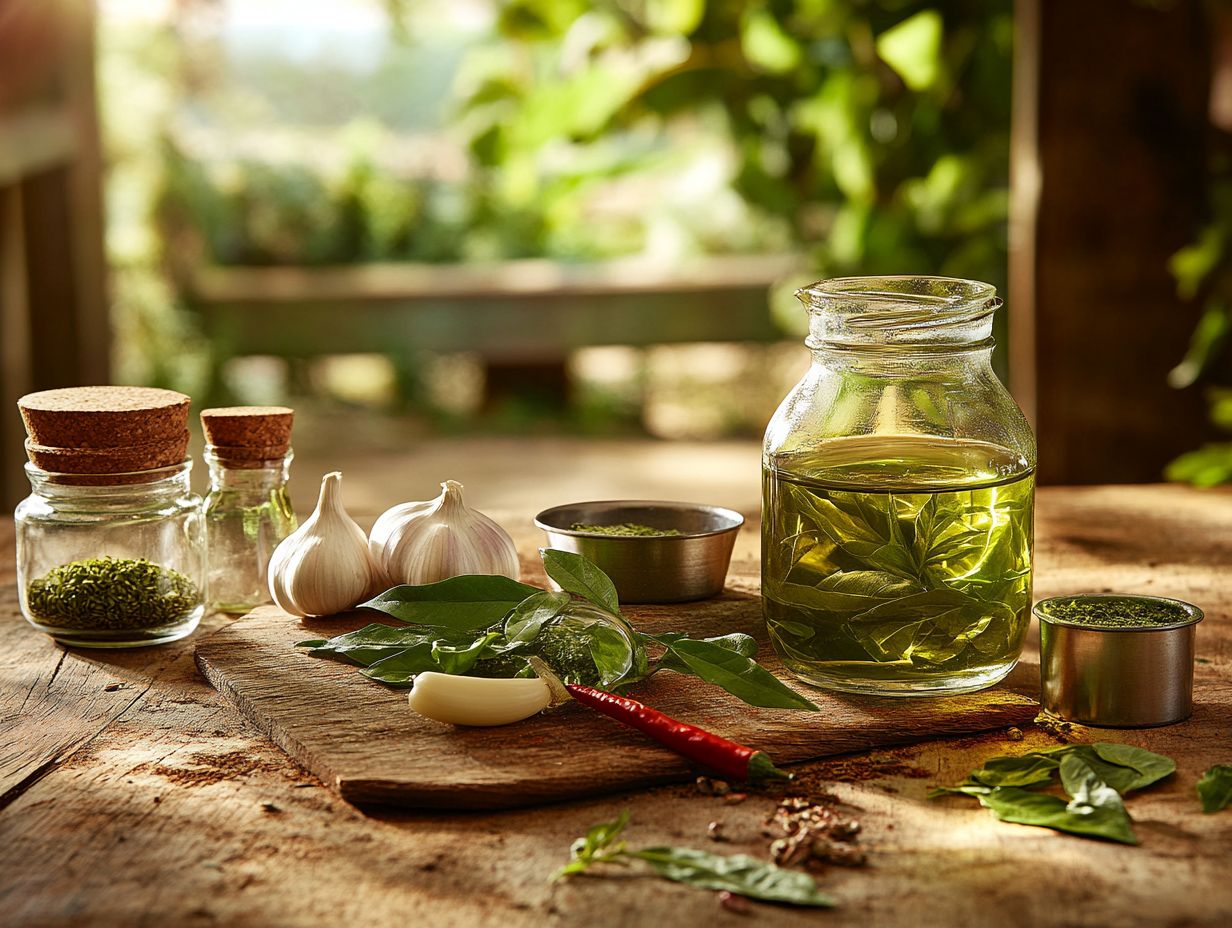
Crafting your own homemade organic insecticides is rewarding. You can customize pest control solutions that perfectly suit your garden’s needs.
Consider recipes like vegetable oil spray, which suffocates pests, and neem oil spray, known for its effectiveness against various pests.
You can also try garlic spray, chile pepper spray, and soap insecticide favorites among organic gardeners for their ability to deter unwanted insects while remaining safe for beneficial ones. These recipes empower you to take charge of your pest management while promoting sustainable gardening practices.
Step-by-Step Instructions for Making Different Types
Creating effective homemade organic insecticides is straightforward. Follow simple step-by-step instructions to achieve the perfect balance of ingredients.
For example, when making a soap insecticide, mix one part liquid soap like Dr. Bronner’s with ten parts water. Stir gently to combine without creating too much foam.
Other formulations, such as neem oil or garlic sprays, require precise measurements and careful mixing to maximize their effectiveness while ensuring the safety of beneficial insects.
By adhering to these structured guidelines, you can craft powerful homemade pesticides that effectively manage pesky insect invaders.
To get started, gather all the necessary materials and ingredients before diving in. For a neem oil insecticide, mix two tablespoons of concentrated neem oil with one tablespoon of liquid soap in a quart of water. Ensure everything is well-blended to prevent separation.
Applying this mixture early in the morning or late in the afternoon minimizes potential harm to non-target insects. This timing maximizes effectiveness against pests.
Similarly, when whipping up a garlic spray, blend several cloves of garlic with water and allow it to steep overnight to amplify its potency. Strain this mixture before application and use a spray bottle for even distribution to achieve successful pest management while safeguarding the health of your plants.
Application and Effectiveness of Homemade Organic Insecticides
The application and effectiveness of homemade organic insecticides greatly impact your success in pest control endeavors. Employ proper application techniques such as focusing on the specific areas of plants where insect pests are most prevalent to significantly enhance the efficacy of solutions like garlic spray and diatomaceous earth.
Diatomaceous earth is a powder made from fossilized algae that helps control pests by dehydrating them. While many homemade insecticides effectively combat common pests, their success can vary depending on factors such as plant sensitivity and environmental conditions.
By understanding these dynamics, you can implement successful pest control techniques with confidence and precision.
Tips for Proper Application and Measuring Effectiveness
To achieve the best results with homemade organic insecticides, follow some key tips for proper application and measuring effectiveness. For instance, applying insecticides during the early morning or late afternoon can significantly reduce the impact of sunlight on the potency of your solution.
Regularly monitor your plant health and pest populations to assess how well your non-chemical methods, like vegetable oil spray and soap insecticide, are performing. By sticking to these guidelines, you’ll ensure that your pest management strategies yield optimal results.
Make it a habit to check pest populations at least once a week to catch any sudden spikes that may need more frequent applications. Keeping a journal is invaluable for tracking when treatments were applied and what results you observed; this will help you refine your methods over time.
Evaluating the impact of these natural remedies, including vegetable oil and neem oil, allows you to determine their effectiveness and adjust ingredient concentrations based on the severity of infestations.
And remember, always conduct tests on a small portion of your plants first. This way, you can ensure that your chosen solution won t negatively affect your flora before applying it more broadly.
Safety Considerations for Using Homemade Organic Insecticides
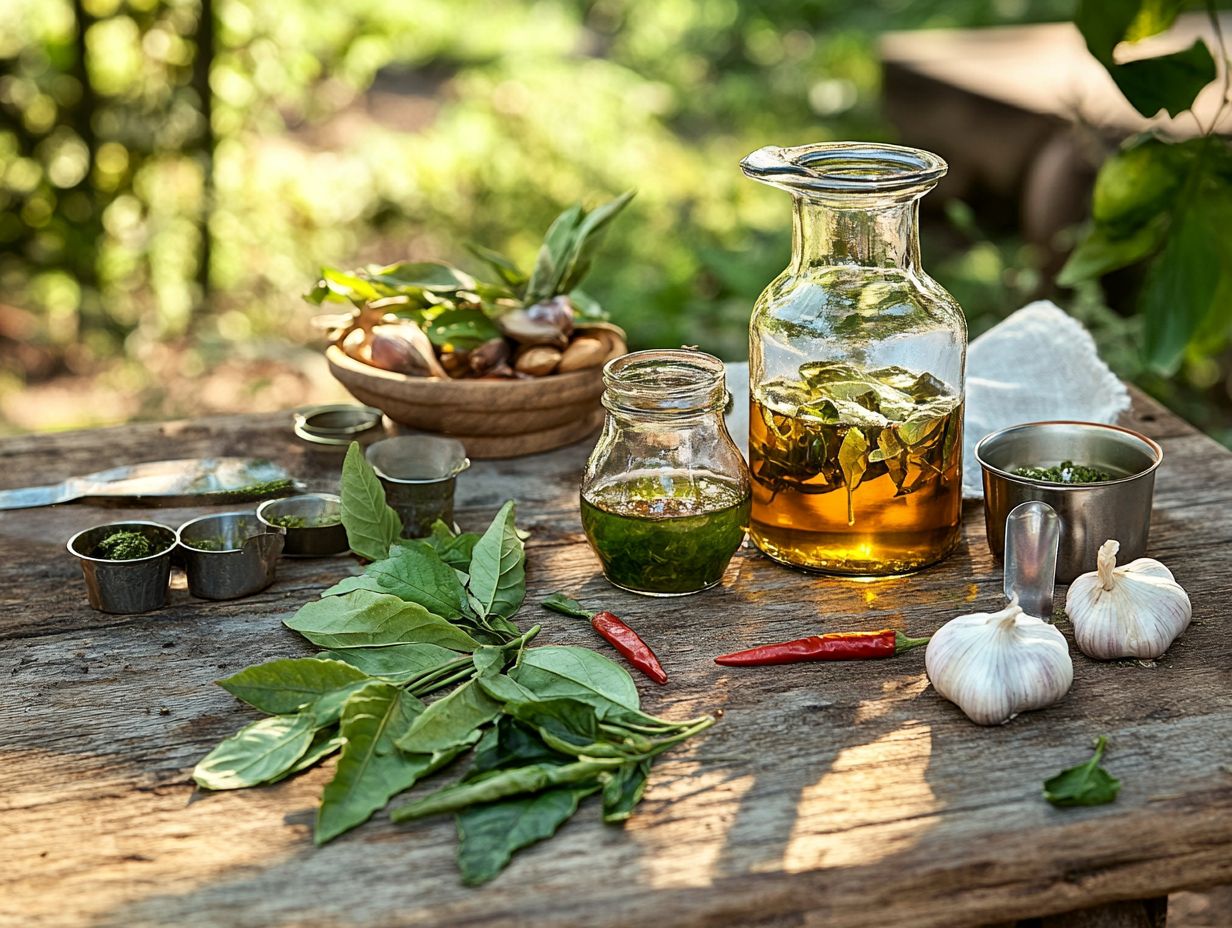
Safety considerations take center stage when using homemade organic insecticides, safeguarding both plants and gardeners alike. While natural ingredients like garlic and neem oil are typically safe, it s imperative to adhere to precautions. Always conduct a patch test on a small area of the plant to check for sensitivity.
Keep homemade pesticides out of reach of children and pets. Even natural substances can lead to unintended consequences if mishandled. Understanding these safety measures empowers you to utilize your homemade solutions effectively while minimizing potential risks.
Precautions and Warnings for Safe Usage
Taking proper precautions and heeding warnings is vital for your safe use of homemade organic insecticides. Before you reach for any insect repellent, always check the ingredient labels closely. Be mindful of potential allergens or sensitivities, especially when handling powerful ingredients like chile pepper or soap.
Wearing protective gear like gloves and masks can significantly reduce any risks associated with applying these homemade concoctions. Follow these precautions to confidently take on pests!
Before you go all in, conduct a patch test on a small area of a plant to check for any adverse reactions. Familiarize yourself with the symptoms of possible sensitivities, such as skin irritation or respiratory issues, to make more informed choices.
Ensure adequate ventilation while mixing and applying these insecticides to minimize inhalation risks. If you have pets or children, exercise extra caution by keeping them away during the application process to prevent any unintended exposure.
Mastering the nuances of homemade organic insecticides boosts your pest control success and enhances your personal safety.
Frequently Asked Questions
1. How do I make a homemade organic insecticide using natural ingredients?
To make a homemade organic insecticide, mix equal parts of water and dish soap with some vegetable oil. This solution can be sprayed on plants to repel insects.
2. Can I use essential oils to make an organic insecticide?
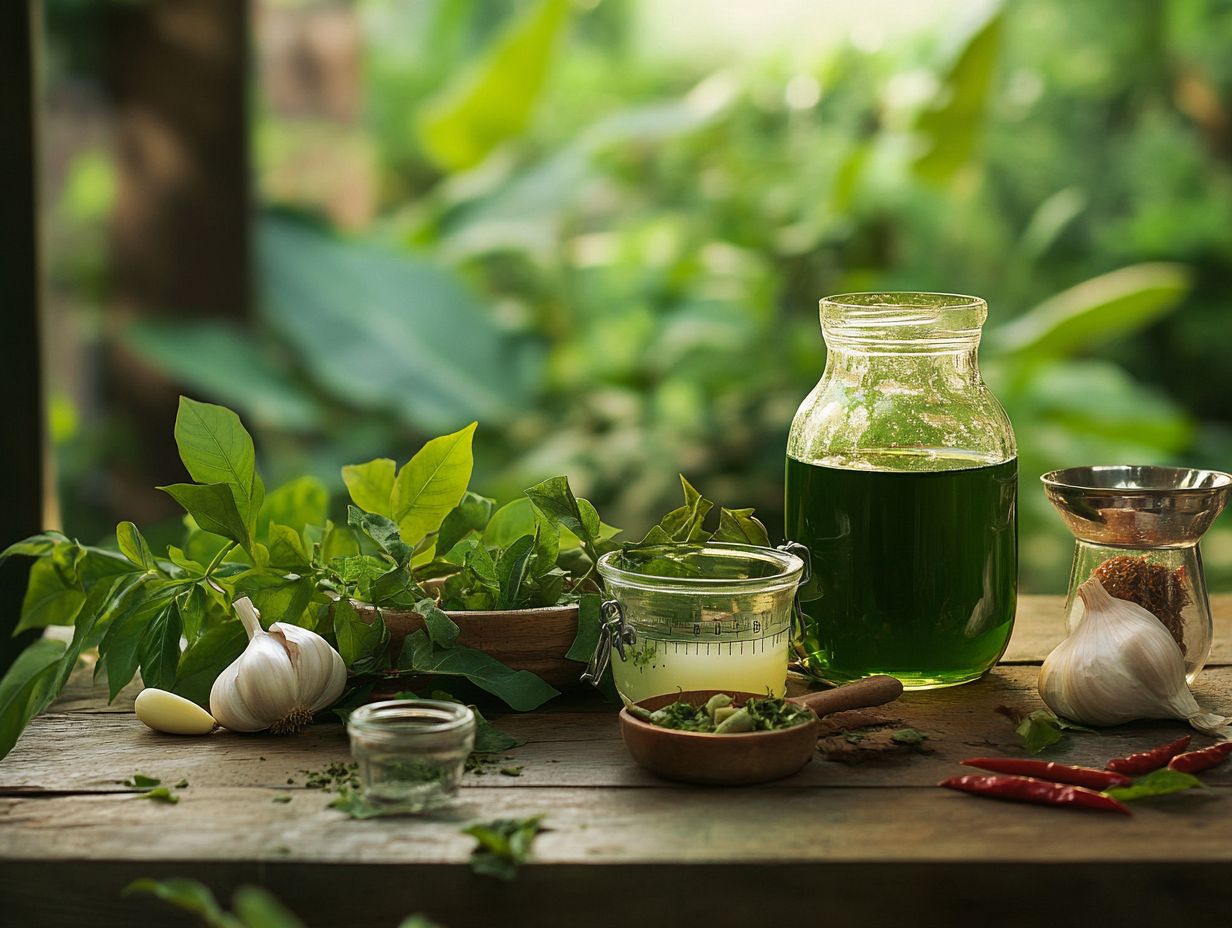
Yes, certain essential oils like peppermint, clove, and neem oil have insect-repelling properties. Mix a few drops of these oils with water and spray it on plants to keep insects away.
3. What are some commonly used organic ingredients for making insecticides?
Commonly used organic ingredients for making insecticides include garlic, onion, hot peppers, and vinegar. These ingredients are natural and can be easily found in your kitchen.
4. Does homemade organic insecticide work as effectively as chemical-based insecticides?
Homemade organic insecticides may not be as strong as chemical-based ones, but they can still be effective in repelling insects. Plus, they are safer for the environment and do not harm beneficial insects.
5. Can I store homemade organic insecticide for future use?
It is recommended to use homemade organic insecticide immediately, as it may lose its potency over time. However, you can store it in a cool and dark place for a few days.
6. Are there any safety precautions to follow when using homemade organic insecticides?
Yes, it is important to wear protective gear, such as gloves and eyewear, when making and using organic insecticides. Also, avoid spraying it on windy days and keep children and pets away from the treated area.



